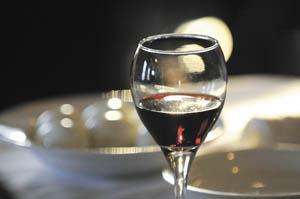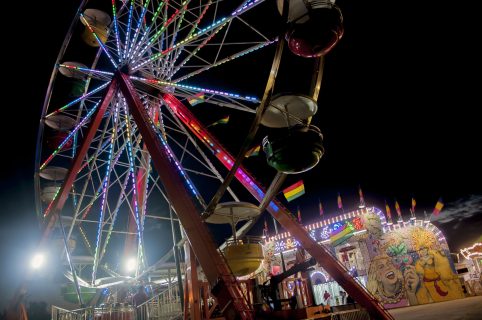A Seder celebration
Published 12:00 am Friday, April 22, 2011

- Miranda Pederson / Daily NewsFour glasses of wine and roasted eggs are a traditional part of a Seder.
The children came forward to light the candle and the people chanted in unison, “Baruch Atah Adonai, Eloheinu Melech ha’olam.” Blessed are you, Adonai our God, sovereign of the universe.
With these words, members of Am Shalom of Bowling Green began their second-night Seder on Tuesday evening, joining with Jews around the world in the celebration of Passover.
Trending
“We are together tonight to recount this story of our deliverance from Egypt,” said Karen Daniel, who came from Nashville to lead the service. “It is the same story the Jewish people have told for over 3,000 years, a story which illustrates our collective birth from slavery to redemption as well as our passion for justice and freedom for all.”
A Seder is a ritual feast that marks the beginning of the Jewish holiday of Passover. Families and communities gather for a Seder, which involves retelling the story of the Israelites’ liberation from slavery in ancient Egypt. A Jewish text called a Haggadah is used to guide the Seder.
“You eat the meal in a set order,” explained Roc Linkov, treasurer for Am Shalom. “With the Haggadah, we tell the story of Passover.”
As Daniel led the service, participants took turns reading from the Haggadah and sharing in the rituals.
During the Seder, participants are to drink four cups of wine representing the four corners of the Earth, the four ancient empires and the four ways in which God promised to free the Jewish people. Greens are used to recall that Passover took place in the spring, a time of hope, but they are dipped in salt water to recall the tears of that moment, tears of sorrow for the years of slavery and tears of joy for being freed.
The matzah, unleavened bread, is eaten to remember that the Jewish people left Egypt hurriedly, not even having time to let the dough rise before leaving. As the matzah is broken, one piece is hidden for the children to find at the end of the Seder.
Trending
The Seder continued with songs, questions, a meal and praise. The children laughed as they searched for the hidden matzah, and parents smiled as their children took part in a holiday that is central to their faith.
For Jews who live in Bowling Green, coming together to celebrate their faith is important. They are a small minority here, Linkov said, with only about 18 Jewish families in Bowling Green. Most have come here because of jobs.
Linkov and his wife moved to Bowling Green in 2003. They were looking to move south and he was offered a job at the National Corvette Museum as events manager.
Practicing Judaism in a non-Jewish region can be challenging, Linkov said.
“It’s a way of life,” he explained. “So for us, it’s important to have that community, no matter how small.”
Am Shalom doesn’t have a building of its own, but it holds services at The Presbyterian Church on State Street. Members are also allowed to attend services at other member reform congregations, such as Temple Micah, and children can attend religious school there.
“We drive to Nashville every Sunday for religious school,” said Laura Jacobs, who has two children, Noah, 9, and Bray, 6.
Raising Jewish children in an area with so few Jews can be difficult, she acknowledged.
“Finding people for them to identify with is hard,” Jacobs said.
Noah, who is in third grade at Cumberland Trace Elementary, said he’s the only Jewish child in his grade, but he’s used to it. There are children with many different beliefs at the school, he said, and once they all shared about their religions and holidays.
Claire Samuels, 14, said she isn’t bothered by being in the minority religiously at Bowling Green Junior High School.
“No one really cares,” Samuels said.
Toby and John Black moved to Bowling Green 34 years ago, and even fewer Jewish families were here at that time.
“We did get together,” Toby Black recalled. “And we belonged to a Nashville congregation.”
More people of the Jewish faith have moved to Bowling Green over the years, many because of Western Kentucky University. But Linkov said raising a child in the Jewish faith is difficult in a place with so few Jews, and that is why many with children won’t come here.
“Here the Jewish community is not going to grow,” Linkov said. “It is probably going to stay small.”
Toby Black said that she took her children to the temple in Nashville for their Jewish education and that traveling back and forth was a challenge.
Another obstacle facing Jews in this area is trying to keep kosher, which means following the dietary guidelines set forth in the Torah.
“Keeping strict kosher here is really out of the question,” Linkov said. “Unless you want to import.
“I had a very traditional, conservative Jewish upbringing,” he explained. But in the South, reform Judaism, which is a more modern, less strict form of Judaism, is more common.
“Many of us were raised conservative,” Black said. “But it’s very hard to be conservative.”
So those who want to keep kosher do the best they can.
“The intent of the law is more important than the letter of the law,” Linkov said.
Linkov said that Am Shalom helps provide a place for Jews in this area to come together to celebrate their faith. Although they don’t have a rabbi here, a traveling rabbi will sometimes visit and at other times, members will lead the services.
“It’s important to have your community that you are part of in the greater world in the community in which you live because that becomes your anchor,” Linkov said. “It’s important that you maintain a connection with what you identify with. It’s part of who you are.”






